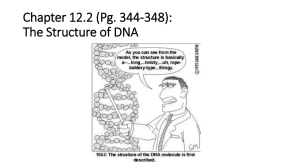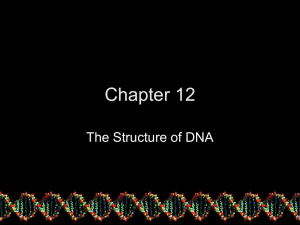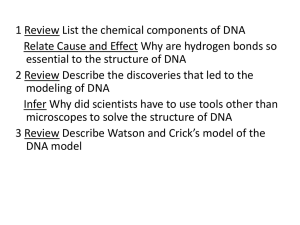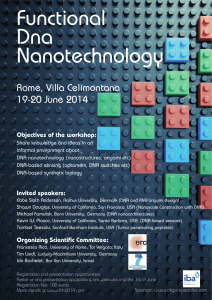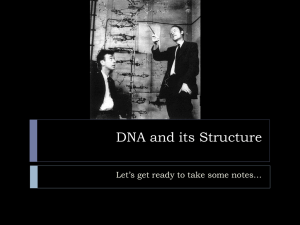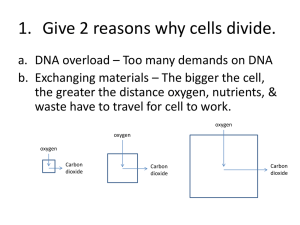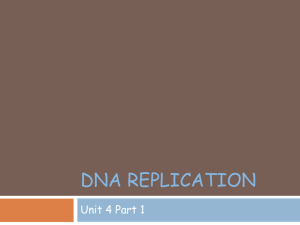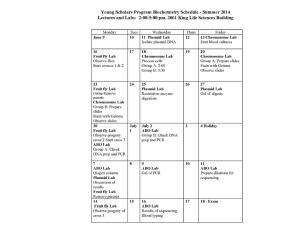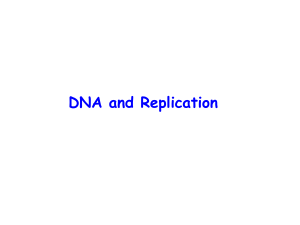Structure of DNA
advertisement
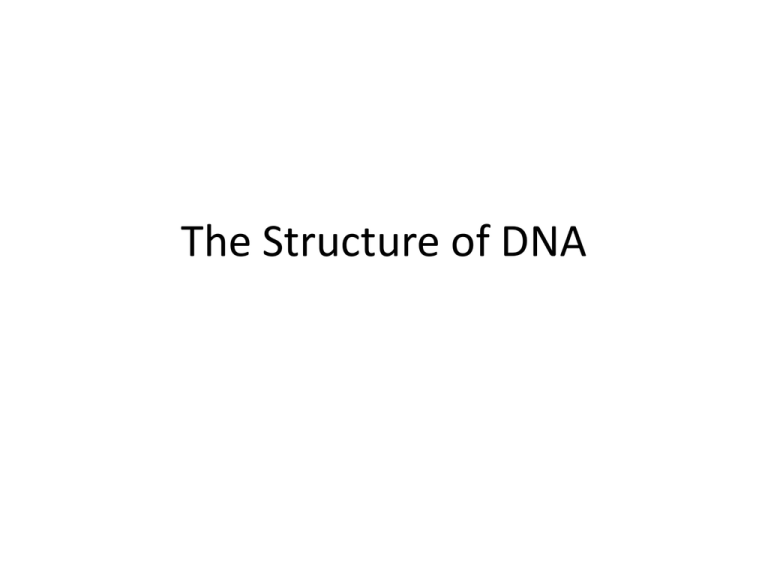
The Structure of DNA What I need to know:1. DNA units are called nucleotides 2. A nucleotide consists of a deoxyribose sugar, phosphate and base 3. There are four bases (cytosine, guanine, adenine and thymine). These bases have complimentary base pairings which are joined by hydrogen bonds 4. Strong chemical bonds form between nucleotides to make a strand of DNA 5. Two DNA strands run anti-parallel to each other and twist into a double helix 6. DNA is arranged so that it tightly coils into a chromosome DNA Do you remember what DNA stands for? Where is it found? What does it code for? DNA Each molecule of DNA consists of 2 strands, where each strand is made up of repeating units called NUCLEOTIDES. The nucleotide is made of : •Deoxyribose sugar •Phosphate •Organic Base 5C 1C 4C 3C 2C Nucleotide There are 4 different types of nucleotides. This is because there are 4 different bases: GUANINE CYTOSINE THYMINE ADENINE Complementary base pairing Each base can only join with one other base. 4 bases: Thymine Adenine Cytosine Guanine This is always the case in DNA – G-C, TA pairs STRONG CHEMICAL BOND links the nucleotides between the phosphate and sugar. They are not easily broken and join nucleotides together into a permanent strand ADENINE GUANINE ADENINE GUANINE The 2 strands are arranged in a twisted THYMINE coil called a “DOUBLE HELIX”. It is often likened to a spiral ladder, where the sugar-phosphate backbone is the railing and the base CYTOSINE are the steps Weak hydrogen bond 5’ 3’ ADENINE GUANINE 3’ THYMINE CYTOSINE Notice how the two strands run anti-parallel to each other 5’ Arrangement of DNA DNA is tightly coiled and found on chromosomes If you take the DNA from one cell it would stretch out to 2 meters! Therefore it is essential that the DNA is arranged so that it fits within the nucleus of a cell It is tightly coiled and packaged around bundles of protein (like beads on a string) Now attempt the following questions 1) How many different types of base molecules are found in DNA? Name each type. 2) Which type of bond forms between the bases of adjacent strands of a DNA molecule? 3) Describe the base pairing rule 4) Draw the complementary strand for the following strand or DNA 5’ C A T G C C A T G T A G 3’ • 5) What term is used to describe the two strands of DNA that run in opposite directions • 6)What name is given to the twisted coil arrangement typical of a DNA molecule? • 7) If DNA is like a spiral ladder, which part of it corresponds to the ladder’s (i) rungs (ii)uprights? Glossary • COMPLEMENTARY – fitting together like a hand in a glove; applied to DNA base pairing • DOUBLE-STRANDED HELIX – describes the spiral ladder shape of DNA molecules • NUCLEOTIDE – unit which consists of a ribose or deoxyribose sugar joined to a phosphate group and to an organic base
